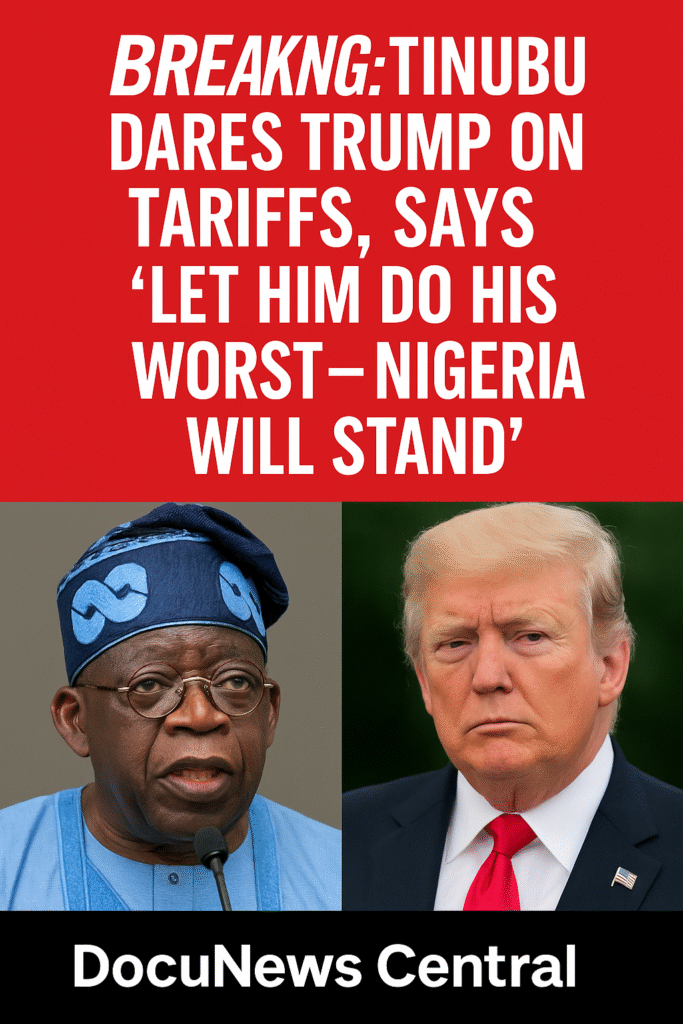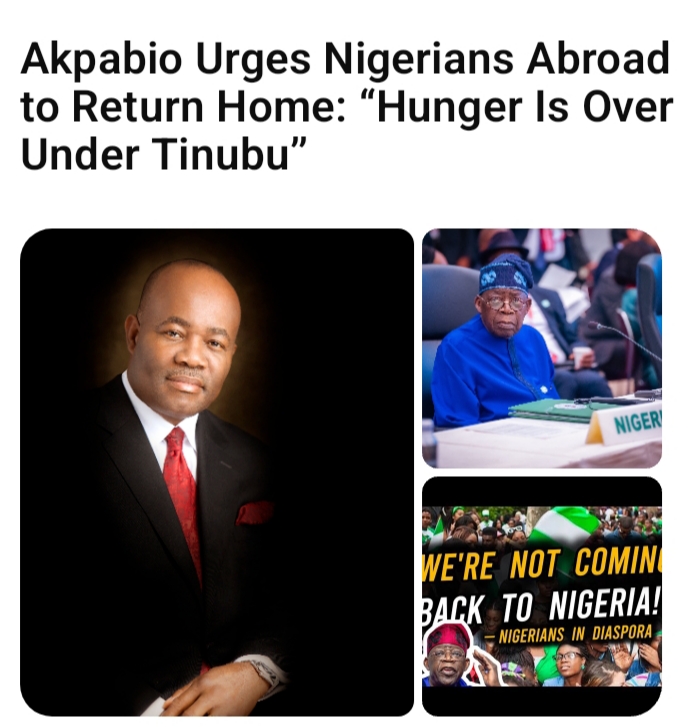
BREAKING: Tinubu Dares Trump On Tariffs, Says “Let Him Do His Worst — Nigeria Will Stand”
President Bola Ahmed Tinubu has spoken with courage on Nigeria’s economy and global trade. His words were sharp. His message was strong. He told the world that Nigeria is ready for challenges. He declared that the country has reached its revenue target for 2025. He also said Nigeria will no longer borrow from local banks. But his strongest statement came when he spoke about Donald Trump’s new tariff plan. He said clearly, “Let Trump do his worst — Nigeria will stand.”
This fiery comment has set off wide debate. Citizens, traders, experts, and leaders across the world are reacting. Some call it bold. Some call it risky. But all agree it was a turning point speech.
Tinubu’s Defiance
The president spoke before an audience in Abuja. His words were direct. He said Nigeria had achieved its yearly revenue target as early as August. He said that was proof of growth. He explained that the government was no longer leaning on domestic banks for loans. He said the nation was steady.
Then he turned to global issues. He spoke of Donald Trump. The U.S. president has returned with a new wave of tariffs. These tariffs hit steel, oil, and farm goods. Nigeria is among the countries affected. But Tinubu was firm. He said Nigeria will not bow. He said the economy has grown strong enough to resist. He told the crowd that Trump could “do his worst” and Nigeria would still survive.
Why This Matters
Tinubu’s words carry weight. Nigeria has long been tied to oil and foreign loans. For years, global shocks hit the economy hard. But now the president says the country is more independent. He points to farming, industry, and new taxes as proof. He insists that these gains give Nigeria a shield.
The mention of Trump was not casual. Tariffs from the U.S. can hurt exports. They can raise prices on imports. They can slow trade. For a country like Nigeria, this is serious. But the president wanted to show strength. He wanted citizens to trust that Nigeria could face it.
The Tariff Issue
Tariffs are taxes on trade. When America adds tariffs, Nigerian goods become more costly in U.S. markets. That makes them harder to sell. At the same time, goods coming from America to Nigeria become more costly too. That can raise prices for Nigerians.
Small businesses, exporters, and importers will feel this pressure. A farmer selling cocoa, a trader importing machinery, or a shop selling American goods may all be hit. That is why many worry.
But Tinubu’s claim is that non-oil sectors now give Nigeria a stronger base. He believes this will soften the blow.
Revenue Growth Story
For decades, Nigeria depended on oil. Each rise or fall in global oil prices shook the economy. Jobs, wages, and growth all depended on it. But Tinubu says reforms have changed that story.
According to him, the country is now collecting more taxes. Farming has expanded. Industry is rising. Technology is adding value. He said all this helped the government meet its full revenue target months early. He called this proof that Nigeria has moved away from full oil dependence.
Debt Still A Shadow
While the president spoke of strength, the numbers show another side. Nigeria’s public debt is still very high. By March 2025, the total debt stood at about ₦149 trillion. That is a steep rise compared to the year before. Some experts say it may even climb to ₦160 trillion by year’s end.
So, while it is true the government is not borrowing from local banks for now, it still owes huge sums to both local and foreign creditors. This makes the bold claim of stability more complex.
Reactions in the Streets
In Lagos, traders showed mixed feelings. A young man selling electronics said, “I like that the president is bold. But if tariffs raise costs, it will hit my sales. That is my fear.”
In Kano, a farmer praised the speech. “For too long oil was the only story. Now they are talking of farming. If they help us, we can feed this nation and stand against tariffs.”
In Port Harcourt, an importer was worried. “When America raises tariffs, it is not words that pay my bills. It is cash. The president can be strong, but my cost will rise. That is real.”
Analysts Speak
Economists are split. Dr. Hassan Musa in Abuja said, “The president has shown confidence. That can lift morale. But the test is in the market. Tariffs will bite. Government must act with policies, not just words.”
Another analyst, Mrs. Ada Nwankwo in Lagos, said, “The talk of no more local borrowing is fine. But our debt is still growing. It is better to speak with caution. Still, I agree that non-oil growth is the right path.”
Others warned that Trump’s tariffs will hurt. They said Nigeria must quickly find new markets. They also said local producers need help to compete.
Trump’s Tariff War
Donald Trump’s new policies have shaken many countries. He calls it “America First.” He says tariffs protect U.S. workers. He argues that foreign nations take advantage of America. By raising tariffs, he wants to stop imports and boost local U.S. factories.
But the world sees it differently. China, Brazil, Nigeria, and others call it a trade war. They say it is unfair. They fear it will hurt global trade.
Tinubu’s speech shows Nigeria is not afraid to resist. He placed Nigeria on the list of countries ready to face the challenge head-on.
Possible Paths for Nigeria
Nigeria can respond in several ways. It can raise tariffs on U.S. goods. It can strengthen ties with other nations like China and India. It can boost trade with African neighbors through the African Continental Free Trade Area.
It can also work harder to produce goods locally. That would cut the need for imports and keep money in the economy. Tinubu hinted at these choices. He said Nigeria must be ready to stand alone if pushed.
Political Tone
Many believe the speech was not just economic. It was also political. Nigerians are facing hard times. Inflation is high. Jobs are scarce. Prices of food and fuel are rising. People want hope.
By standing up to Trump, Tinubu may win support at home. He looks strong. He looks brave. He looks like a leader who can defend his people.
But critics say this is style over substance. They say what citizens need is action: lower prices, more jobs, better services. Strong words cannot replace daily bread.
What Citizens Want
On the streets, citizens want relief. They want cheaper food. They want stable power. They want safety in their towns. They want better schools and hospitals.
Many say it is good that the government has met its revenue target. But they ask, where will that money go? Will it fix roads? Will it pay teachers? Will it build hospitals?
For them, what matters is not just global trade wars. What matters is life at home.
Global Eyes on Nigeria
Other nations are watching. Some African leaders may follow Tinubu’s bold stand. They may also resist Trump’s tariffs. Others may stay silent to avoid conflict.
China and India may use this moment to grow closer to Nigeria. They may offer trade deals. They may step in to fill the gap left by the U.S.
In Washington, officials have not replied to Tinubu’s “Let Trump do his worst” line. But experts say the U.S. will note it. Relations may face tension in the coming months.
Conclusion
Tinubu’s speech was not ordinary. It was defiant. It was bold. It was sharp. He told Nigerians that the nation is stable. He said revenue targets are met. He said borrowing from local banks is over. He said Trump’s tariffs will not break the country.
For citizens, the words bring both hope and doubt. For analysts, the speech raises both praise and questions. For the world, it shows Nigeria is ready to stand tall.
Time will tell if these words hold true. For now, Tinubu has drawn a clear line. He has dared Trump. He has told the world that Nigeria will not bend. He has promised that Nigeria will stand.
DocuNews Central will keep following this story. Readers can subscribe for updates on Nigeria’s economy, global trade, and government policy.









Can Nigeria make it?